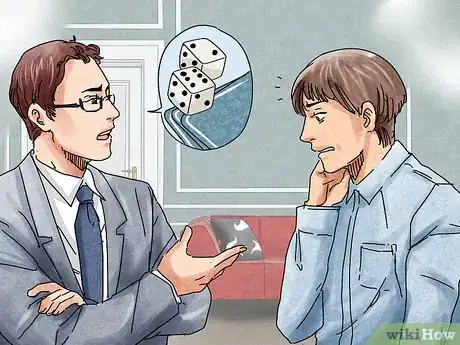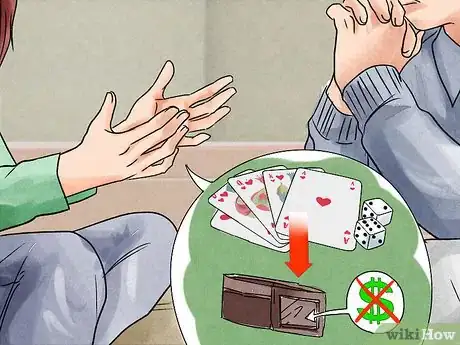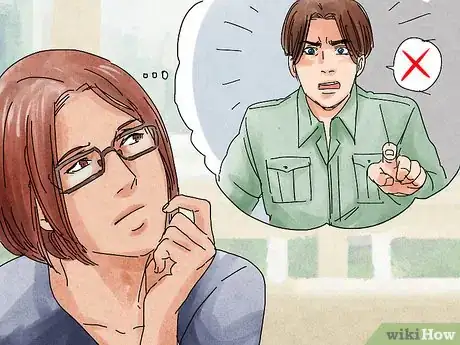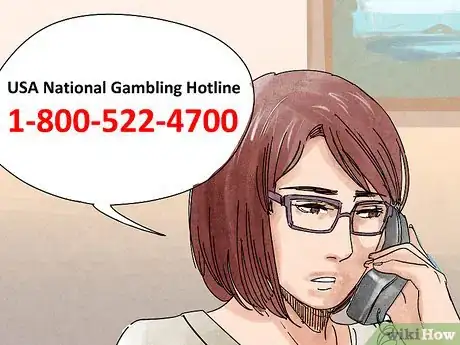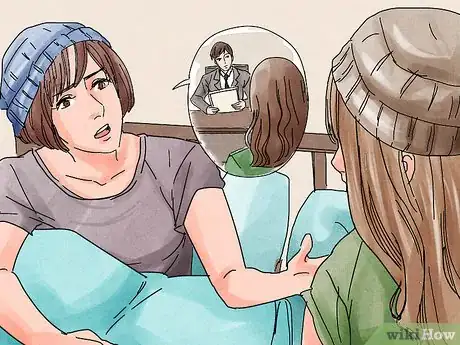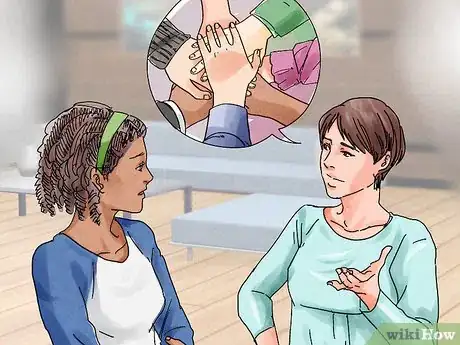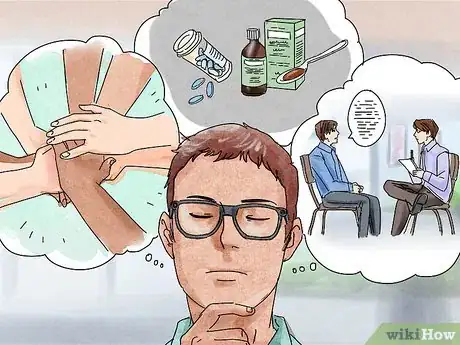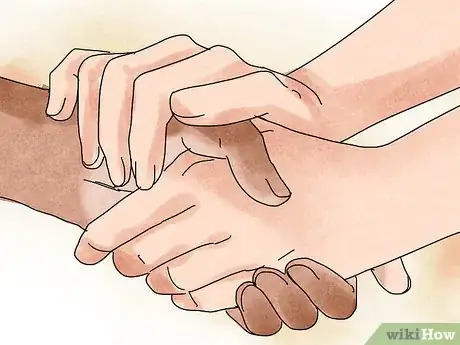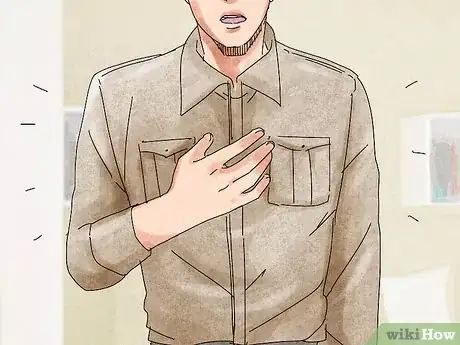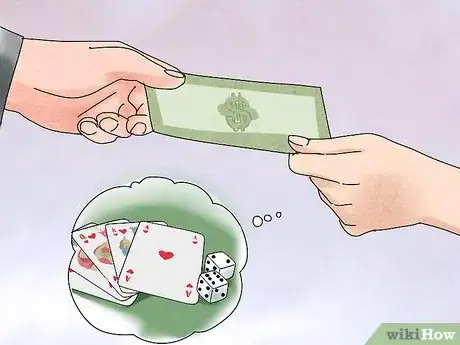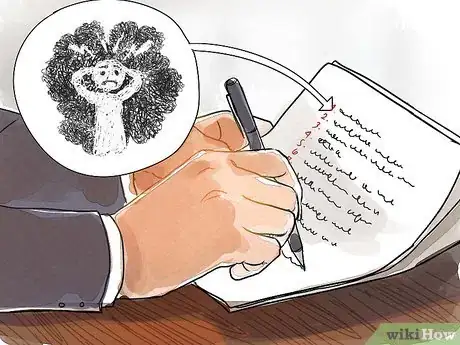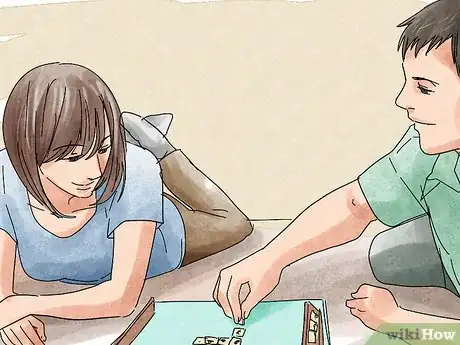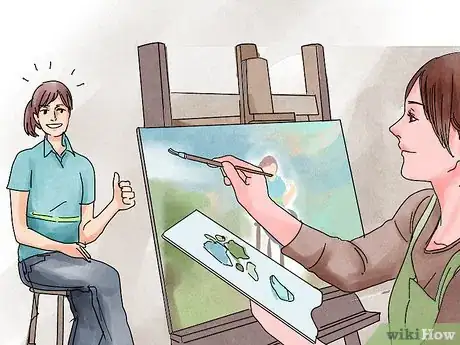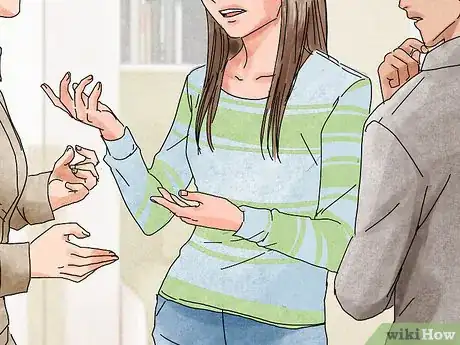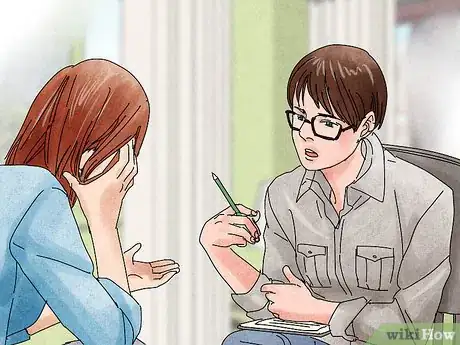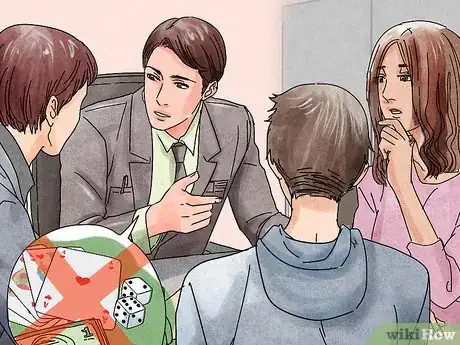This article was co-authored by Natalia S. David, PsyD. Dr. David is an Assistant Professor in Psychology at the University of Texas Southwestern Medical Center and a Psychiatry Consultant at Clements University Hospital and at Zale Lipshy University Hospital. She is a member of the Board of Behavioral Sleep Medicine, the Academy for Integrative Pain Management, and the American Psychological Association’s Division of Health Psychology. In 2017, she received the Baylor Scott & White Research Institute’s Podium Presentation Award and scholarship. She received her PsyD from Alliant International University in 2017 with an emphasis in Health Psychology.
There are 8 references cited in this article, which can be found at the bottom of the page.
This article has been viewed 52,641 times.
Compulsive gambling is a serious addiction that can cause severe consequences. A person who is a compulsive gambler can recover with treatment, but it’s hard sometimes for a person struggling with compulsive gambling to realize they need help. You can help a compulsive gambler by getting them to acknowledge the problem, seek treatment, make lifestyle changes, and supporting them.
Steps
Acknowledging the Problem
-
1Identify signs of a gambling problem. Not everyone who gambles has a problem with it. It is important to determine whether or not the other person has an addiction. There are many common symptoms of compulsive gambling that you can look for.[1]
- Many times, compulsive gamblers will not only spend a long time gambling but they may be desperate to find more and more money to gamble with. Lying, stealing, or engaging in illegal activities to get more money are clear signs that there is a problem.
- A compulsive gambler may constantly increase the stakes or money so that they can get a bigger thrill.
- A compulsive gambler may try to hide their habit from family and friends. This means that they may lie about how often or how much they gamble. They may also be in denial about the extent of their problem.
-
2Talk to them about their problem. If you want to help a compulsive gambler, you may need to discuss the problem. This may be when you start to see a pattern of behavior leading to compulsive gambling or after the person has gotten into trouble due to their gambling.[2]
- To decide if you should bring it up to the gambler, you should look at your relationship with the person. Are you close, or are you just casual acquaintances or colleagues? If you are not close to the person, you may want to discuss any problematic behavior you see with someone close to the gambler, like a spouse, family member, or close friend.
- Start by asking, “Do you think your gambling has become a problem?” After listening to their answer, you can say, “I care about you and I am worried. I’ve noticed that you are gambling more and using money in your savings. I’d like to talk about the possibility of a gambling problem.” You may also say, “I am concerned because you said you were only going to gamble $20, but you gambled hundreds.”
Advertisement -
3Avoid judging them. The other person may become defensive when you begin the talk. Try to remain calm, and avoid being accusatory. Be sympathetic to their issues, and avoid judging them for their problem. Expressing anger or blame will inevitably lead to problems.
- Avoid starting sentences with "you." Instead, use "I" statements. For example, instead of saying, "you're wasting all of your money," you can say, "I'm worried about how much money you're spending."
- Ask them about other parts of their life as well. Is there anything they're unhappy about? Are they struggling with depression or other issues?
-
4Explain the consequences. When you talk to the person about their gambling problem, calmly explain the consequences that can arise from their behavior. Don’t yell or get angry. Instead, remain logical as you present facts about the harm and damage compulsive gambling can lead to.[3]
- For example, you may want to talk about the depletion of savings and the legal problems if you gamble money you don’t have. You can mention how gambling can put the person and their family into debt and cause problems for their loved ones. Gambling may also lead to violence, stealing, and lying.
- You may want to say to the person, “Gambling can be fun when controlled. However, gambling can become a serious addiction. If you can’t control your gambling, you may end up in debt or losing the money you’ve worked so hard to save. Gambling may even end with jail time if you can’t pay your debts.”
-
5Prepare for any reaction. Some people may be glad that you brought up the issue because they didn’t know how to bring it up themselves. However, some people may get extremely angry or defensive when you mention they have a problem. They may think you are accusing them of something or become confrontational. Others may just refuse to talk about it.[4]
- If the conversation doesn’t go well, let it go and broach the subject later. Avoid trying to push the subject when the other person is angry or unwilling to communicate.
Encouraging Treatment
-
1Call a gambling hotline. You may want to suggest that the person contacts a gambling hotline as a starting point to getting help. This can help them come to terms with having the gambling problem and help them admit it or realize the negative consequences.[5]
- The United States has a national gambling hotline that a person can call at 1-800-522-4700. Most states have a gambling hotline that a person can call to talk anonymously to someone about their gambling addiction. Gambler’s Anonymous lists all state hotlines by state. There are also hotlines provided for those who live outside of the United States. In Great Britain, you can call the National Gambling Helpline at 0808 8020 133.[6] Search online for a hotline in your area.
-
2Suggest treatment. You should encourage the person to get treatment for their compulsive gambling. Gambling is an addiction and can be managed and recovered from using various therapy techniques. It is very difficult to overcome compulsive gambling without the help of a mental health expert.[7]
- Keep in mind that they must recognize their own addiction before treatment. If they don't think that they have a problem, treatment may not be very effective.
- Therapy sessions help the person figure out why they gamble or diagnose any underlying conditions. In therapy, the person can learn how to cope with triggers and stressors that may lead to impulses and relapses.
- If the gambling is severe, the person can go to inpatient treatment.
- Say, "I'm proud that you have acknowledged that you have a gambling problem. Compulsive gambling is a treatable condition. Here are some numbers for therapists who can help" or "I think you should get help for your compulsive gambling. Here are some places that treat your condition."
-
3Encourage them to go to a support group. Self-help groups are helpful for people with gambling addictions. Support groups help the compulsive gambler meet with others who have experienced similar things. They can learn from each other, and share difficulties, successes, and coping techniques.[8]
- Gamblers Anonymous is a popular self-help group for those addicted to gambling. You can talk to your doctor or therapist about where to find a good self-help group in your area. You can also contact local hospitals or clinics about support groups. Search online to see if you can find any groups in your area.
- You may say, "Many gamblers find it helpful to connect with other recovering gamblers. You should try going to a Gamblers Anonymous meeting" or "I think you would benefit from going to a support group meeting. You can talk to others who understand what you are going through."
-
4Consider medication. You may tell the person to consider medication to help treat their compulsive gambling. Medication can treat any underlying or related disorders, such as bipolar, depression, OCD, or ADHD.[9]
- The doctor may prescribe antidepressants, narcotic antagonists, or mood stabilizers.
Encouraging Treatment Follow Through
-
1Give encouragement. Recovering from compulsive gambling can be a long, hard road. The person may get discouraged or feel hopeless. Help them by encouraging them that they are on the path to recovery and doing better. Help them think about taking everything one day at a time.
- If the person has a relapse, help them stay positive and focused on treatment and recovery.
- For example, say, "I am proud of what you have accomplished. You went three months without gambling. This was a minor slip up, but it doesn't erase your hard work" or "You have done really well getting your finances back in order. I believe you can continue to stay gambling-free. You're strong, and I have faith in you."
-
2Offer to be their designated person. People who have certain addictions, like compulsive gambling, benefit if they have a sponsor or designated person that can help them if they face any problems during recovery. Gambling may be readily available, presenting temptation to the person. Offer to be someone the person can call or talk to when they find themselves in a stressful situation or on the verge of a relapse.[10]
- For example, you may say, "If you don't have anyone to call or talk to if you feel the urge to gamble, you can talk to me. I am here for you if you need me."
-
3Identify triggers. Most compulsive gamblers have specific triggers that will make them want to gamble. These triggers are situations, items, moods, or feelings that may lead to compulsive behavior or relapses. Help the person identify their triggers. This can help them know what to avoid or allow them to learn how to cope when faced with these triggers.[11]
- Money is a common trigger for compulsive gamblers. Having cash or extra money in the bank account can trigger gambling. Needing money for bills or other debt may also trigger gambling.
- Free time or boredom may lead to gambling.
- Being near gambling, such as in a casino, a place with Keno, at a dog or horse track, or near lottery cards, may trigger someone.
- Extreme highs or lows in moods may trigger the gambling impulse.
-
4Make a list of reasons not to gamble with them. The person may benefit from a list of reasons they want to stop gambling that they keep with them. This list can help them if they feel the urge to gamble or get in a compromising situation. They can read the list before making the decision to gamble, and hopefully avoid a relapse.
- Encourage the person to make the list themselves and come up with their own reasons. They should come up with their own personal reasons for not gambling, like not wanting to disappoint their family, not wanting to lose their trust, and increasing their debt.
- They may also want to update this list as time passes without gambling. One reason not to gamble could be, "I have gone without gambling for one/three/six months and don't want to break my streak."
Supporting the Person
-
1Keep the person busy. Some people relapse because they are bored or have unstructured time. To help with this, help the person learn how to keep busy. You can spend time with the person and do things, like go to movies, have dinner, or exercise together. Encourage the person to make a schedule and fill their time so they won’t be tempted to gamble.[12]
- Help the person learn how to fill their down time. They can spend time with family and friends, work on a list of movies they’d like to watch, or read books they’ve been wanting to read.
- You may say, "How would you like to go to the movies?" or "Why don't you call your family and spend the weekend with them?"
-
2Encourage that the person pursue hobbies. A way the person can fill their down time and refocus their attention away from gambling is to find hobbies to replace the gambling. This can also help them fill any down time. If they were interested in activities before they started gambling, they can get back into those. They can also try new things.[13]
- For example, the person may join a gym and take up weightlifting. They may take a painting class or start drawing.
-
3Help them work on their finances. You may want to help the person work on getting their finances in order. Compulsive gambling can lead to serious financial consequences and debt. The person may be at a loss with how to get things back in order, so you can help them figure out how to approach their financial situation.
- For example, you may help them give the control of their credit cards and bank accounts to someone they trust, like a partner or family member.
- Suggest they see a financial planner. If that is not an option, sit down with the person and their debt and come up with an action plan for paying back what is owed.
- Helping them come up with a plan doesn’t mean lending them money or paying things for them. You shouldn’t bail a compulsive gambler out of debt. Instead, help them deal with the consequences of their actions.
Taking Care of Yourself
-
1Join a support group. As you help someone with compulsive gambling, you should meet with others who are also help recovering gambling addicts. This can help you find support you need as you deal with the person’s addiction and any negative feelings.
- Talk to a therapist who specializes in compulsive gambling. You can also join a support group for the family or friends of recovering gamblers. These support groups may help you learn how to process your own feelings while learning how to support and help the person.
-
2Process your feelings. Depending on your relationship to the compulsive gambler, you may have many negative emotions to work through. You may feel betrayed, angry, frustrated, ashamed, or sad. You may have lost trust in a person you care about, and the relationship may have changed for the worse. These emotions are common when dealing with an addict. Allow yourself to process and work through the emotions. Don’t try to suppress them.
- Talk to someone about it, whether it’s a friend, therapist, or family member. You may even want to talk to the person about how they made you feel. For example, you can say, “I feel very hurt by your gambling. I am ashamed that we have debt and I am angry that you stole money from me.”
- Consider writing your thoughts and emotions down. You can write in a journal, or you may consider writing a letter to the person.
-
3Accept what has happened. Part of moving on and recovering is accepting what has happened. Dwelling on the past will do nothing for you or the compulsive gambler. Instead, acknowledge what happened, accept that it is a fact and happened, but move on. This may mean that you forgive the person, help them get treatment, or distance yourself from the person temporarily.
- Don’t obsess about gambling losses or the way things could have been. That is unhealthy thought patterns. Instead, focus on the future and what can be done to make things better.
-
4Develop a support network. Helping someone who is a compulsive gambler can be emotionally taxing. You should take care of yourself first. If you can, get someone to help you with the person. You should also have people around you who can give you support as you help the person.[14]
- Your support network may be friends, family, or a therapist.
References
- ↑ http://www.mayoclinic.org/diseases-conditions/compulsive-gambling/symptoms-causes/dxc-20258394
- ↑ http://www.psychguides.com/guides/how-to-help-someone-with-a-gambling-problem/
- ↑ http://www.psychguides.com/guides/how-to-help-someone-with-a-gambling-problem/
- ↑ http://www.psychguides.com/guides/how-to-help-someone-with-a-gambling-problem/
- ↑ http://psychcentral.com/lib/treatments-for-compulsive-gambling/
- ↑ http://www.nhs.uk/Livewell/addiction/Pages/gamblingaddiction.aspx
- ↑ http://www.helpguide.org/articles/addiction/gambling-addiction-and-problem-gambling.htm
- ↑ http://www.mayoclinic.org/diseases-conditions/compulsive-gambling/basics/treatment/con-20023242
- ↑ http://www.psychguides.com/guides/how-to-help-someone-with-a-gambling-problem/
- ↑ http://www.psychguides.com/guides/how-to-help-someone-with-a-gambling-problem/
- ↑ http://www.gamblinghelpline.co.nz/data/media/documents/Triggersforgambling_000.pdf
- ↑ http://www.helpguide.org/articles/addiction/gambling-addiction-and-problem-gambling.htm
- ↑ http://www.helpguide.org/articles/addiction/gambling-addiction-and-problem-gambling.htm
- ↑ http://www.goodtherapy.org/learn-about-therapy/issues/gambling-addiction
About This Article
Dealing with a compulsive gambler can be difficult, but you can support them by offering emotional support and helping them get treatment. Compulsive gamblers can often be in denial, so it’s important to gently tell them that they have a problem if you haven’t already. Say something like, “I think your gambling is getting out of control and you’re losing a lot of money, but I care for you and I want to help you if you’ll let me.” Try to encourage them to get therapy or join a support group for compulsive gamblers. When they get the urge to gamble, encourage them to focus on other hobbies, go for a walk, or do something else to distract themselves. Let them know that you’re proud of them when they resist their urges. For more tips from our co-author, including how to take care of your own mental health, read on.

